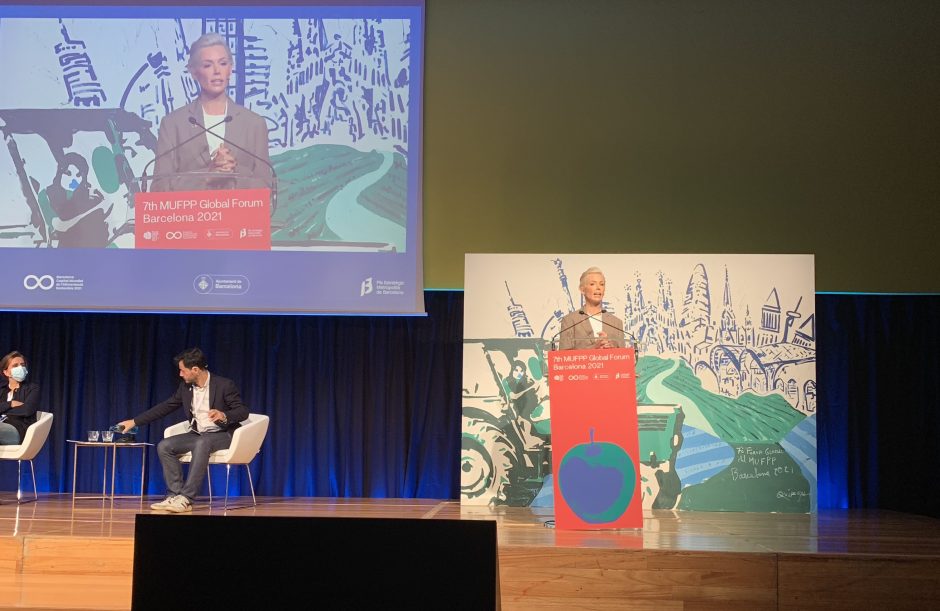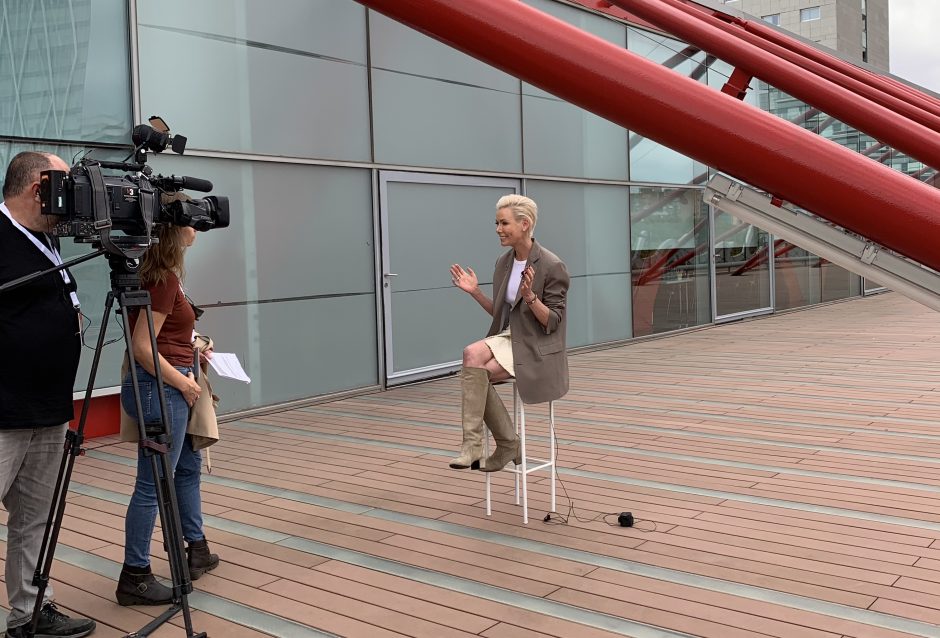In October 2021, local governments from around the world gathered in Barcelona, the 2021 World Sustainable Food Capital, for a week of events hosted by the Catalonian city – showcasing international work and collaboration in the push towards sustainable food systems, ahead of COP26.
Why is city leadership around food crucial to addressing climate change? Food systems account for up to 37% of global greenhouse gas emissions. Cities consume 70% of the world’s food supply, a figure that is expected to rise to 80% by 2050. Addressing how cities procure, distribute, consume, and waste food can have massive impacts on the planet, and our own health. More nimble than national governments and with closer relationships to their citizens, local authorities are well-placed to implement policies and support programs with tangible results.
October 2021 was a big month for cities, celebrating the great strides they are making in the global food system transformation and coming together to address barriers and share experiences. EAT had the honor of attending many of the activities taking place in Barcelona and took the opportunity to push for sustainable healthy diets for people and the planet. Below are some highlights from our time there:
The FoodSHIFT 2030 Stakeholder Innovation Conference and Barcelona Lab Showcase, both on October 18th, shared how the European project is putting citizens at the center of food systems change and how food technology can be applied to address a range of urban food challenges. You can find out more on their website or watch the recording on YouTube. EAT is a partner in the FoodSHIFT2030 project.
“For me personally, the FoodSHIFT Stakeholder Innovation Conference has been a fantastic experience. Being able to meet in person is extremely motivating for collaborating on our common goal of transforming the European food system, and I am very impressed by the presentations from the innovators from the Barcelona Lab. Furthermore, the whole week has been a great opportunity for meeting a lot of different people engaged in sustainable urban food systems.” – Christian Bugge Henriksen, University of Copenhagen, Coordinator of FoodSHIFT2030
The Milan Urban Food Policy Pact 7th Global Forum, on 19-21 October, focused on the topic of “Growing Resilience: Sustainable Food to tackle the Climate Emergency.” Launched in 2015, the Milan Urban Food Policy Pact (MUFPP) now includes more than 200 cities representing 400 million inhabitants. The MUFPP brings participating cities together to exchange knowledge and celebrate and scale successful practices through an awards program and annual gathering. The Forum saw the participation of 500 attendees, with delegates from more than 100 cities, scientists, international agencies and civil society organizations committed to working on urban food policies. Taking place in Barcelona alongside so many other food-related events, and on the eve of COP26, gave this year’s gathering special momentum.
The Food Trails project, of which EAT is a member, organized a session at the Forum, bringing five EU Horizon2020 projects together, to connect, exchange and advance impact beyond Europe. The Food 2030 Project Family (Food Trails, FoodSHIFT2030, FoodE, Fusilli and Cities2030) gathers a total of 43 local authorities and represents 26 million citizens. These five projects are working to transform their food systems and gathered to exchange practices for co-creating food policies with their citizens. You can find out more about the event and its recording on the Food Trails website.
EAT also organized a session at the Forum, featuring representatives from the cities of Barcelona, Lyon and Rio de Janeiro, as well as the Gasol Foundation, the World Health Organization, to showcase cities addressing health and inequalities through food. Diet-related illness is now the leading cause of premature deaths in the world. Our cities are perhaps the most promising arena for fixing food, may it be by providing tasty and healthy school meals, promoting local and organic produce, supporting healthy cooking programs for families or by restricting advertising of unhealthy foods. You can find the recording on the MUFPP website.
“We need food system action that tackles health and inequality, but also climate change and loss of biodiversity. There is no health on a dead planet, and we cannot tackle diet-related disease with surgery and drugs; we need to address the underlying root causes, and shift diets.” –Gunhild Stordalen as part of her opening remarks at EAT’s session of the Global Forum.

Significantly, the Barcelona Challenge for Good Food and Climate was launched at the Global Forum, and signed by cities in South America, Africa, and Europe. It is a call for cities and their residents to engage in commitments to transform food systems to tackle the climate emergency. It draws on EAT and C40’s Good Food Cities Declaration, in which cities commit to achieving a Planetary Health Diet for all by 2030.
Other activities took place outside the formal FoodSHIFT and MUFPP events:
The City of Barcelona organized a series of public events in the city as part of the lead up to the Global Forum, including exhibitions, courses, participatory installations, tours and workshops, all focused on sustainable food.
EAT’s Executive Founder and Chair, Dr. Gunhild Stordalen, was interviewed as part of a local Catalan TV news, reporting on the Global Forum. Gunhild Stordalen highlighted the impacts of climate change on food, but also how food can be part of the solution: “Food is equally important as energy to tackle climate change. […] We have the science, we have the solutions – what we need now is political will.
 And last but not least, the University of Barcelona piloted an EAT-Lancet Planetary Health Diet menu in two of its canteens over the course of the week. The menu was developed in collaboration with the university’s nutritionists. You can find out more on their website (in Spanish).
And last but not least, the University of Barcelona piloted an EAT-Lancet Planetary Health Diet menu in two of its canteens over the course of the week. The menu was developed in collaboration with the university’s nutritionists. You can find out more on their website (in Spanish).
“The university community – from catering services to students – came together to develop this innovative initiative that changed our food environment to ensure access to sustainable food. The support was impressive, with over 50% of the menus consumed in those canteens ascribing to a Planetary Health Diet, with some days, being as many as 75%. There is not only a need for change in university food services, but it is possible and has wide support. We can be part of this global movement to build a livable future through science and education, while also transforming our practices beyond the lecture theaters.” – Dr. Ana Moragues Faus, Ramón y Cajal Research Fellow at the University of Barcelona, Faculty of Economics and Business
These activities hosted in Barcelona in October 2021 illustrate how cities and local governments play a key role in our global effort to address the climate and health crises, building momentum on the ground, as we work to achieve our goals for the Paris Agreement and beyond 2050.